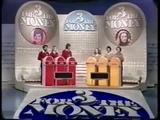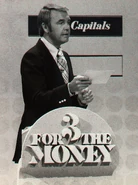| Host | |
| Dick Enberg | |
| Announcer | |
| Jack Clark | |
| Broadcast | |
| Pilots: 8/3/1975 NBC Daytime: 9/29/1975 – 11/28/1975 (did not air from 11/3-7/1975) | |
| Packagers | |
| Stefan Hatos/Monty Hall Productions | |
"(first two contestants' names). They will be playing as team #1, and their celebrity captain is (celebrity)! (last two contestants' names). They will be playing as team #2, and their celebrity captain is (other celebrity)! All this week, these two teams will battle to win, in cash and prizes, worth over $30,000, on 3 FOR THE MONEY! And here's the host of our show, Dick Enberg!"
3 for the Money (or Three for the Money) featured two teams (dressed in red & yellow sweaters) of three players (two of them were civilian contestants and the third was a celebrity captain) played against each other for one whole week trying to guess a series of subjects from a series of clues, all while trying to win thousands of dollars in cash & prizes.
Gameplay[]
Main Game[]
Round 1[]
The team that was behind (or won the coin toss if it was the first game of the week) played three categories; each one had three questions which consisted of nothing but clues. On each category, the celebrity team captain chose which player to play the category and how many players on the opposing team to play against. On each question, three clues were revealed one at a time; the first player to buzz in had a chance to answer; a correct answer won money for the team, but an incorrect answer gave the opposing team a chance to answer by seeing the rest of the clues. Each player on the controlling team could only play one category.
Scoring[]
Money values were determined by how many of the opposing team the chosen player played against:
- 1 player – $100
- 2 players – $200
- 3 players – $300
If the opposing team buzzed in and answered right, they won $100.
Round 2: The Catch-Up Round[]
Round 2, the Catch-Up round, was played the same as Round 1 except it was played against the clock, and the questions were rapid-fire. Also, the questions were all general knowledge. The round lasted for two minutes (2:00), and the team that was behind kept control of the round until they took the lead, at which point the clock stopped. Upon the clock stopping when the lead changed hands, the now-trailing team decided who to play and who to play against. During their turn, the team celebrity captain could stop the clock voluntarily by asking for a "timeout"; thereby switching players on either or both teams; each celebrity captain could only call a timeout once per game.
If time ran out in the middle of a question, that question had to be finished. When time ran out, the team with the most money won the game. If the game ended in a tie, host Enberg read a tiebreaker question in which all six players participated. The first player on either team to buzz in with a correct answer won the game for the team, but if the buzz-in player was wrong, the game went to the opposing team.
Bonus Round[]
The winning team played a bonus round for more cash. To start, the winning team chose one of the final three categories to play with. Then they had 45 seconds to solve seven words/phrases/names, with each one appearing one letter at a time.
NOTE: When it came to a multiple word answer, the spaces were represented by a slash.
Players on the winning team alternated turns and if a player made a mistake, he/she was out for the rest of the game. Each correct answer was worth $100 and guessing seven puzzles correctly won $1,000 on Monday, $2,000 on Tuesday, $3,000 on Wednesday, $4,000 on Thursday, and $5,000 on Friday (meaning that winning all five bonus rounds earned the team $15,000).
As previously stated, all six players participated all week long. The team with the most money at the end of the week won the match: the winning contestants on that team kept all the money they won from the week; in addition, each contestant also won a new car. The runners-up won a $1,000 Spiegel gift certificate.
Rating[]
Studio[]
NBC Studio 4, Burbank, CA
Trivia[]
This is one of the few game shows invented by Monty Hall that he did not host himself.
Music[]
Sheldon Allman & Stan Worth
Several cues borrowed from Let's Make a Deal were used on this show.
The mains were used as masquerading cues on the 70's version of Masquerade Party.
Links[]
Curt Alliaume's 3 for the Money Page
3 for the Money at The Game Show Vault
YouTube Videos[]
The full September 29, 1975 Premiere (Linda Kaye Henning/Tony/Dona vs. Dick Gautier/Kim/Art, Game 1)
Part 1
Part 2
A full episode from November 14, 1975 (Barbara Feldon/Chris/Carroll vs. Jim McKrell/Danette/Darryl, Game 5)
Part 1
Part 2


